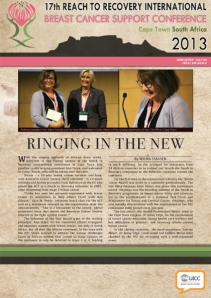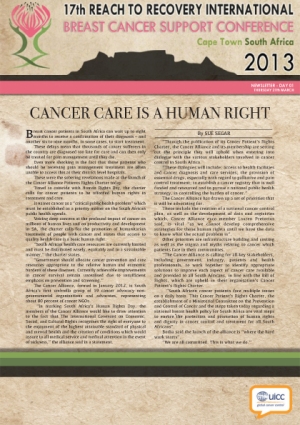![JOH 2012 photo shoot [1600x1200]](https://17thrri.files.wordpress.com/2013/03/joh-2012-photo-shoot-1600x1200.jpg?w=300&h=199)
Kathy Malherbe, a journalist covering the 17th International breast Cancer Support Conference for three days is also a breast cancer survivor. She wrote many of the stories on this blog and in our newsletter.
Kathy is 53 and lives with her son Justin, 20, in Rondebosch, Cape Town. Her other son, Phillip, 23, works on a luxury yacht in France. After living with breast cancer for years, Kathy decided it was time to make a difference. She learnt to ride a motorbike and then hopped onto a 650CC Honda with a group of breast cancer survivors to spread a message of hope across the country.
‘When you are a survivor of any kind, life is not just there anymore. Each new day is precious. Facing your own mortality comes with this gift. The gift of being able to live in full consciousness and being grateful every day.’
Just before Christmas in 2000, I discovered a lump in my breast. When I went for surgery – a lumpectomy – the doctors found out there were in fact four tumours. I had radical surgery, reconstruction and glands removed from under my arm. My sons were 8 and 11 at the time, and my biggest fear was leaving them behind. They were too young to be without their mother. I remember thinking, ‘please let me survive until they have both matriculated.’
It was ironic, and in retrospect I should have perhaps bargained a bit better, that when I went for my check-up in 2010, the same year Justin, my youngest son was in matric, the doctors discovered another lump. I had a lumpectomy and radiation therapy. I have another three years of hormone therapy ahead of me.
At the time it felt like a death sentence
I was only 39 when I was diagnosed with breast cancer, which in my mind was fairly young. It felt like a death sentence at the time. I had so many problems with both surgeries and sometimes the physical difficulties were overwhelming. But I realised that you can’t fight cancer on your own. You need help – medical and from friends – even though it is sometimes hard to accept it. And my sons gave me a reason to fight.
I was also given an opportunity that not many parents have. Because I was aware of the fact that I might not be with my boys to the end of their school careers, I savoured every precious moment I had with them. I spent many nights catching up on work because I had spent the day at their school events. But it was worth every minute. And now I have a tapestry of wonderful memories to look back on. I still cherish every second I spend with them. They are exceptional young men and they have been through so much. They are very supportive of me.
It was during my radiation therapy in 2010 that I decided to give something back. But during my radiation, when I was too tired to put one foot in front of the other, I thought of those women who have to catch a taxi to the hospital, wait all day for treatment and then take a taxi home. I had a car, an appointment at the radiation department and friends cooking for me. And was exhausted
So in 2011, I decided to join the Journey of Hope motorbike ride. The 1700km ride by 15 breast cancer survivors (two men and 13 women) aimed to spread the message that early detection can mean a 95% survival. We also raise funds for those less privileged.
Learning to ride
Before my first lesson I was so terrified I was in tears. But a fellow rider lectured me saying that learning to ride was nothing compared to what I had already been through. I fell off the bike 5 minutes into my first lesson in a very undignified manner! Picking gravel out of my hands, I decided no motorbike was going to get the better of me!
After much practice, I rode the 1700kms through the northern part of South Africa in October 2011 last year, spreading the message and raising funds.
The camaraderie between the riders and the support team was incredible. There were tears and laughter, and we were always met with huge smiles and open arms by the people we met – despite the unbearable heat along the way!
In 2012 I again rode in the Journey of Hope ride – from Johannesburg to Durban and back – this time as spokesperson for the group. It was an incredible experience and I do believe we touched many people along the way.
Bringing hope to sufferers
Sometimes the group of bikers would leave towns in a flurry of sirens and flashing lights as ambulances and police cars escorted us out of town. As we rode off we were always aware we were the lucky ones, and hoped to bring encouragement to those who may face the challenges we did.
A wish list
My ambitions and goals changed after I was diagnosed too. I decided to make a wish list of things I would like to do in the five years following my diagnosis, and slowly started to do them. I focused more on my career as a freelance journalist. I also always wanted to snow ski and made a point of saving up and taking my sons on a skiing holiday. And I learnt to play the piano. Believe me I am no Beethoven but I love my weekly lesson and play with gay abandon whenever I can. I never lose sight of the fact that I have been very, very lucky.
The campaign pays tribute to that woman who have lost the battle, and encourages women to be vigilant about keeping in touch with their health. The value of early detection cannot be stressed enough. We also hope to banish the stigma and fear surrounding breast cancer.
Erma Bombeck, wrote this in her famous poem, If I had my life to live over’ after she found out her breast cancer had spread:
‘But mostly, given another shot at life, I would seize every minute… look at it and really see it … live it…and never give it back.’
I’ve been given another two shots at life….



![JOH 2012 photo shoot [1600x1200]](https://17thrri.files.wordpress.com/2013/03/joh-2012-photo-shoot-1600x1200.jpg?w=300&h=199)



